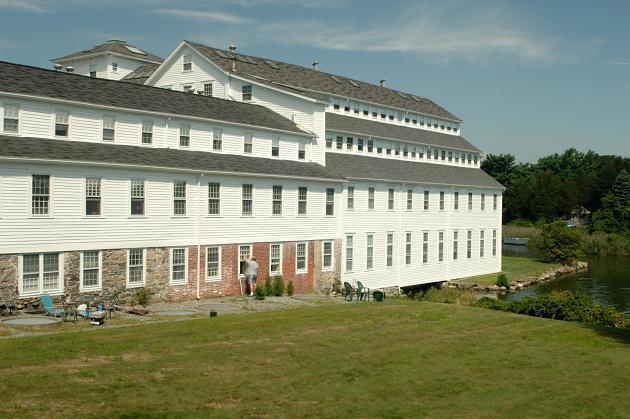
Things seemed to go bad all at once at Hamilton Harbour.
Rot ate away at the exterior siding at the 67-unit condominium complex in North Kingstown. Cracks and potholes deepened on the roadways. Roof leaks grew plentiful.
Two old mill buildings had been converted to the Hamilton Harbour condos in the mid-1980s, but little had been done to maintain them.
“People sat by and didn’t think anything was going to go wrong,” said Justin Carron, vice president of the condo association’s board of directors. “In this case, everything happened all at once because of the years of neglect. We got ourselves in a bad position.”
There was a time when it would have been difficult for the condo association to obtain a loan to finance the desperately needed capital improvements. Associations typically own little of value that can be offered for collateral, so many lending institutions stayed away.
Times are changing.
Hamilton Harbour borrowed $400,000 in February from Waterbury, Conn.-based Webster Bank. Instead of a one-time assessment of $7,500 to finance the renovations, residents pay $60 to $70 a month. “It saved us,” Carron said last week of the loan.
Webster is one of a growing number of financial institutions that have found a niche where banks once feared – or did not care – to tread: loaning money to condo associations.
“A lot of banks didn’t see where the collateral would be in a common-interest community,” said Claudette Carini, executive director on the New England chapter of the Community Associations Institute. “But we’re seeing more and more banks getting into the condo loan business. There’s a lot in Connecticut and Massachusetts.”
Webster executives said last week that they have a loan product and staff members dedicated to offering financing to organizations such as trade groups and professional associations with limited collateral.
Launched in 2005, Webster’s association financial services program is now putting an emphasis on reaching out to condo associations, according to Ana Dyer, senior vice president of business and professional banking.
“Condominium associations are a very big target for us,” Dyer said. “They’ve had a very difficult time trying to borrow. Very few banks are doing this type of lending.”
The need is there. Many condo developments from the 1980s are aging and in need of major renovations. The loans allow condo boards to move forward with these projects immediately while spreading assessments over time.
Frank A. Lombardi, a Providence-based lawyer who works with condo associations to secure this type of financing, said he has worked on 10 deals this year, involving lenders such as NewAlliance Bank, based in New Haven, Conn., and First National Bank of Arizona.
Still, he said, most of the bigger banks are not focusing on this market.
The residents of the 14-unit Wellington Park in Newport found that out firsthand.
Years ago, they had taken four years to save enough money for a re-roofing project. But when multiple things failed at once, “we didn’t think we could wait long enough to self-finance,” said William Coffey, treasurer of the development.
Coffee said the property manager approached several local banks looking to finance extensive improvements, and he didn’t have much luck until he reached Webster.
The bank examined Wellington Park’s financial situation and the scope of the work to make sure the residents weren’t overextending themselves. In the end, the condo association was approved for a $100,000 loan, which required a $200 monthly assessment for each unit over seven years, Coffey said.
Dyer said Webster has financed several hundred projects in Rhode Island, Connecticut and southeastern Massachusetts, ranging from simple painting jobs to pool projects to tennis court renovations. Loan amounts have ranged from $25,000 to $1 million.
Interest rates are comparable to those offered for other types of commercial loan. “The difference is the bank is not taking property as collateral,” Dyer said, “so we are really relying on the payment of monthly assessments.”
Lombardi started shepherding condo associations through the loan process about five years ago, and it’s only gotten busier. Such loans have been prevalent in other areas of the country for some time, but “we’re seeing it now really coming to New England,” Lombardi said.
And problems in the mortgage industry have made the need that much greater. For condo owners struggling with adjustable-rate mortgages, “they can’t afford one big assessment,” Lombardi said.
There are options. Condo associations can pull from their cash reserves, but many are already underfunded. Some condo groups can start saving, but many repairs can’t wait.
Renovations at Hamilton Harbour were well under way when things took a turn for the worse about two months ago. A wooden gate in an old waterway that runs under the former mill disintegrated, sending water flooding into some of the units. The emergency repairs cost $70,000, paid for through the Webster loan.
The loan allowed residents to avoid a large one-time assessment that wouldn’t have made financial sense for those who plan to live there only for the short term. “Every person here is in a different place in their life,” Carron said. “So if you’re going to be leaving in a year, it’s probably not a good investment.”
Another benefit: 90 percent of the projects at Hamilton Harbour are complete, and the residents are excited about seeing things getting fixed quickly as opposed to a little at a time.
“It’s kind of contagious,” Carron said. “The resident see it and they want to fix the inside of their units. It’s a good morale booster.” •











